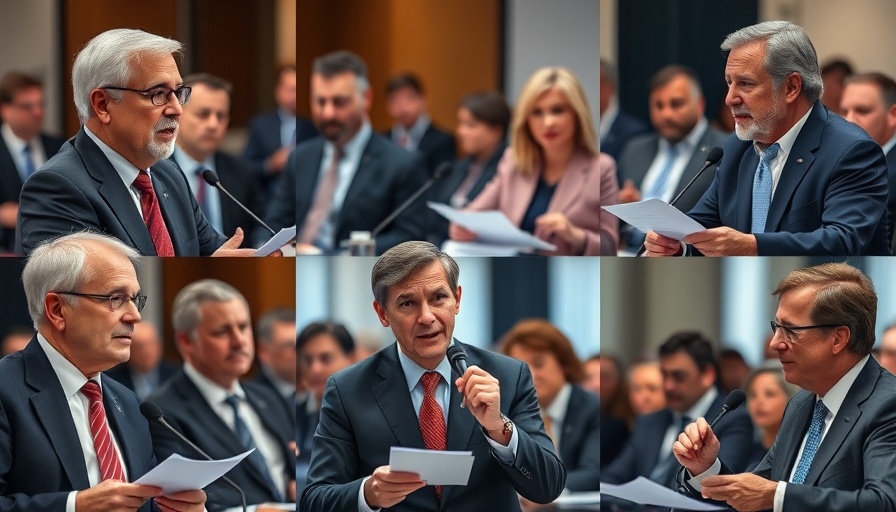
Political Factionalism in Nigeria: A Growing Concern
The political landscape in Nigeria has faced significant shifts recently, especially among the major opposition parties. With notable defections from the People's Democratic Party (PDP) and the Labor Party, the once formidable block that sought to challenge the ruling All Progressives Congress (APC) is struggling to maintain a unified front. This fragmentation raises vital questions about the opposition's ability to contest effectively in the upcoming elections.
In 'Political Realignments: Peter Obi, Atiku, El-Rufai, and Amaechi in Coalition Talks', the discussion dives into the crucial dynamics of political divisions and alliances in Nigeria as they prepare for the transformative 2027 elections.
Defections: The Political Exodus
In recent months, key figures such as the governors of Rivers and Akwa Ibom states have transitioned from the PDP to the APC. These defections are not just individual choices; they signify a broader trend of disillusionment with party leadership and direction. As former PDP director Ola Deiji Fabi pointed out in a recent discussion, the party is grappling with self-inflicted injuries and external crises that have diluted its political capital.
The political exodus is alarming, leading several lawmakers to switch allegiances, which has left the PDP limping towards the 2027 elections. Fabi described the situation as 'pathetic,' highlighting that the lack of concrete principles and ideologies in the party’s leadership has significantly contributed to its ongoing struggles.
Labor Party's Internal Challenges
Meanwhile, the Labor Party, which saw a surge in popularity due to the influence of figures like Peter Obi, is also experiencing turmoil. Kennedy Anu, the party's National Youth Leader, acknowledged that while the party has made strides in establishing discipline, it is grappling with notions of personal interests that have affected its unity. The party has claimed to have strong internal structure and discipline, however, observers note the need for coherent leadership to navigate the forthcoming political landscape.
Coalitions: The Path Forward?
In light of these internal challenges, discussions around coalition-building have emerged as a potential pathway for opposition parties. The PDP’s Atiku Abubakar has been a strong advocate for uniting various opposition entities to present a formidable challenge to the APC. This kind of coalition would ideally center on achieving national stability and implementing competent governance. As Fabi suggests, the coalition is fundamental for uniting the voices of discontent and proposing an alternative that resonates with the electorate.
The Future of Opposition Politics
The future is uncertain as internal crises continue to plague both major opposition parties. Wisdom Chap Jumbo, a public affairs analyst, observed a lack of readiness and direction within both the PDP and the Labor Party. He emphasized the necessity for these parties to reflect honestly on their past mistakes and form a cohesive strategy going forward. The upcoming elections will provide a litmus test for the capacity of Nigeria's opposition to rise above personal ambitions and unite for the greater good.
Public Sentiment and Political Ripple Effects
Public sentiment is crucial in determining the political landscape, and the growing discontent with internal party dynamics among Nigerians may lead to abstention from the political process altogether. As citizens grow increasingly frustrated with the status quo, the demand for accountability and real change becomes even more pronounced. If party leaders fail to address these internal issues, there could be significant consequences at the ballot box come 2027. The electorate is looking for earnest leadership that prioritizes the country's future over individual ambitions.
By analyzing current trends in Nigerian politics, it is clear that cohesive action from political parties is essential not just for their survival but for the health of the nation’s democracy as a whole. If coalition talks can be capitalized on effectively, there may yet be hope for a competitive electoral landscape in the years to come.
In conclusion, the political terrain in Nigeria is characterized by significant shifts and challenges. The interplay of defections, party internal strife, and aspirations for coalition underscores the urgency for leadership that is both principled and inclusive. The trajectory to 2027 is fraught with confusion, but it remains pivotal for contemporary Nigerian politics.
 Add Row
Add Row  Add
Add 


 Add Row
Add Row  Add
Add 

Write A Comment